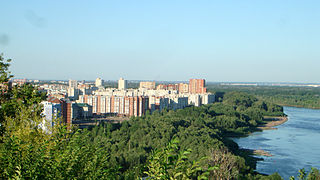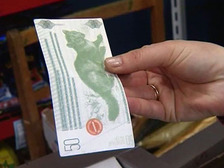Bashkir farmers' local demurrage currency recognized by Supreme Court
The original of this article is in Russian and this translation of it isn't professional, but I think the news of this is of importance for us and should be shared even if imperfectly.
Chances are, you have not heard of the Republic of Bashkortostan. It is one of many individual States that were part of the old Soviet Union, the USSR, and that now are part of the Russian Federation which formed after the Soviet Union dissolved. Wikipedia has an article on history and more here: Bashkortostan The people of Bashkortostan are the Bashkir.

Ufa City, capital of Bashkortistan (image from Wikipedia)
It seems the farmers of a Bashkir village were successful in creating a workable demurrage-based currency and to have its legality recognized by their country's Supreme Court. Quite a feat, which incidentally has eluded us in the West ever since the Austrian Supreme Court shut down Silvio Gesell's and Mayor Unterguggenberger's successful currency experiment in Wörgl 80 years ago...
So now that we have some context, here is the article. The original in Russian is also available.
Bashkir farmers who invented their own currency have created an economic miracle
The Supreme Court of Bashkortostan allowed the villagers of Shaymuratova to pay in "shaymuratikami." It is a kind of local money - or rather, trade coupons. They can buy products only in one village. A system of mutual settlements is offered by local farmers. But the local prosecutor sought to prohibit this kind of currency .
- - -
For "shaymuratiki" you can buy any product in local stores, you can even pay them for services. However, this replacement of money was not to the liking of the local prosecutor's office, which ordered to stop circulating the currency. But a businessman appealed. However the Supreme Court of the Republic sided with the farmers and legalized the "shaymuratiki." These commodity tickets were able to raise the whole rural economy.
It would seem nothing unusual had happened: in the rural shop customers pay for goods. But for payment, the cashier not only accepts rubles, he also welcomes the so-called "shaymuratiki" - a local village currency. The unusual bills appeared in rural purses several years ago, when the local agricultural enterprise was in a difficult financial situation: the processors no longer paid the peasants their "living" money, and for a long time no salaries were paid. Then the farmer Arthur Nurgaliyev, together with some partners, came up with the trade tickets: you can make a deal on them right now, and then exchange them for real money.

"These are trade coupons" - says the businessman. "On the back of the bill there is a table that shows how the tickets become cheaper as time passes. You cannot stash that money - you can only spend it."
Externally, they are really very similar to normal bills: well designed and there are even different features for protection. But the difference is that the tickets are cheaper than their original denomination. The "shaymuratiki" lose two per cent of their value per month. When everyone around was out of money and had to buy goods on credit, sales in the shaymuratovskih village stores began to grow by leaps and bounds.
The effect of the new economic model in Shaymuratova was felt almost immediately. Implementation of its domestic currency has not only resulted in the survival of most agricultural enterprises, but it also pushes the whole rural economy. For the first time in many years, turnover has increased by an incredible 12 times in one go.
However, along with news of success in Shaymuratova came a raid. The prosecutor's office found violations and demanded to cancel and take the "shaymuratiki" out of circulation, but they have not disappeared. The Supreme Court got on the side of the peasants and recognized the legitimacy of the trade tickets.
"It is not money, because the coupons do not have the function of accumulation", says Mikhail Khazin, an economist. "In the case of agriculture, the problem is that the profit of farmers is received in the fall, and people should always pay. So this is a support tool. As soon as there is good money, "shaymuratiki" fall from use, they do not compete with the money."
This experience in the implementation of a local currency is not only interesting for the neighboring farms, but also for economists. It turned out that "shaymuratiki" could become a universal means of payment among farms in crisis. But there are plans of the shaymuratovskih farmers now to organize the transfer of all payments in electronic form. Employees instead of paper coupons will be issued credit cards.
So far the translation of the article. If there are any Russian speakers among my readers, please tell me of any mistakes I might have made editing.
Now the question really is: Will we be able to learn from this breakthrough as well?
There is no telling, but I suppose we can be cautiously optimistic.
Comments
April 21, 2013 11:00 PM | Posted by: https://me.yahoo.com/a/_PhnMj0c0u0KEAGiEpbbgZit71SGsIfL2oX4EIl_kkHI54YL.A--#c3ff2
Having once been what is now called a Forensic Accountant, I find this news spectacular.